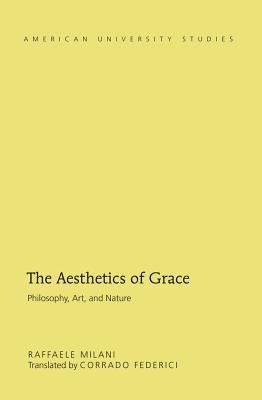
- We will send in 10–14 business days.
- Author: Corrado Federici
- Publisher: Peter Lang Inc., International Academic Publishers
- ISBN-10: 143312338X
- ISBN-13: 9781433123382
- Format: 16.3 x 23.4 x 1.8 cm, hardcover
- Language: English
- SAVE -10% with code: EXTRA
The Aesthetics of Grace; Philosophy, Art, and Nature (e-book) (used book) | bookbook.eu
Reviews
Description
In The Aesthetics of Grace: Philosophy, Art, and Nature, Raffaele Milani traces the fascinating history of the idea of 'grace' from ancient times to the 1700s. Although this term has been displaced by other concepts with the advent of modernism and postmodernism, the complex ideas related to the notion of 'grace' remain an important aesthetic category, and Milani presents an impressive panorama of reflections on and interpretations of the subject. The subtitle of the work indicates the broad scope of a study that recounts the origins of the term in Latin gratias (favor, regard, or gift), corresponding to the Greek Kharites (givers of beauty and charm). The volume then goes on to examine the Middle Ages, when the concept acquires a more specifically religious meaning (divine mercy, thanks), the Renaissance, when the terms 'gracefulness' and 'elegance' come to dominate in the treatises of the time, and the Ages of Romanticism and Neoclassicism, with their particular treatment of the topic. In the process, Milani meditates on the visual representations of these multiple meanings in the form of second-century frescoes, fifteenth-century paintings by Botticelli, Raphael, Titian, Da Vinci, Mantegna, Correggio, and Carracci, seventeenth-century canvases by Poussin and sculptures by Bernini, and eighteenth-century sculptures by Antonio Canova and paintings by Fragonard. This engaging work weaves with skill and subtlety philosophical, theological, and artistic ideas into a stimulating tapestry.
EXTRA 10 % discount with code: EXTRA
The promotion ends in 13d.12:16:00
The discount code is valid when purchasing from 10 €. Discounts do not stack.
- Author: Corrado Federici
- Publisher: Peter Lang Inc., International Academic Publishers
- ISBN-10: 143312338X
- ISBN-13: 9781433123382
- Format: 16.3 x 23.4 x 1.8 cm, hardcover
- Language: English English
In The Aesthetics of Grace: Philosophy, Art, and Nature, Raffaele Milani traces the fascinating history of the idea of 'grace' from ancient times to the 1700s. Although this term has been displaced by other concepts with the advent of modernism and postmodernism, the complex ideas related to the notion of 'grace' remain an important aesthetic category, and Milani presents an impressive panorama of reflections on and interpretations of the subject. The subtitle of the work indicates the broad scope of a study that recounts the origins of the term in Latin gratias (favor, regard, or gift), corresponding to the Greek Kharites (givers of beauty and charm). The volume then goes on to examine the Middle Ages, when the concept acquires a more specifically religious meaning (divine mercy, thanks), the Renaissance, when the terms 'gracefulness' and 'elegance' come to dominate in the treatises of the time, and the Ages of Romanticism and Neoclassicism, with their particular treatment of the topic. In the process, Milani meditates on the visual representations of these multiple meanings in the form of second-century frescoes, fifteenth-century paintings by Botticelli, Raphael, Titian, Da Vinci, Mantegna, Correggio, and Carracci, seventeenth-century canvases by Poussin and sculptures by Bernini, and eighteenth-century sculptures by Antonio Canova and paintings by Fragonard. This engaging work weaves with skill and subtlety philosophical, theological, and artistic ideas into a stimulating tapestry.


Reviews